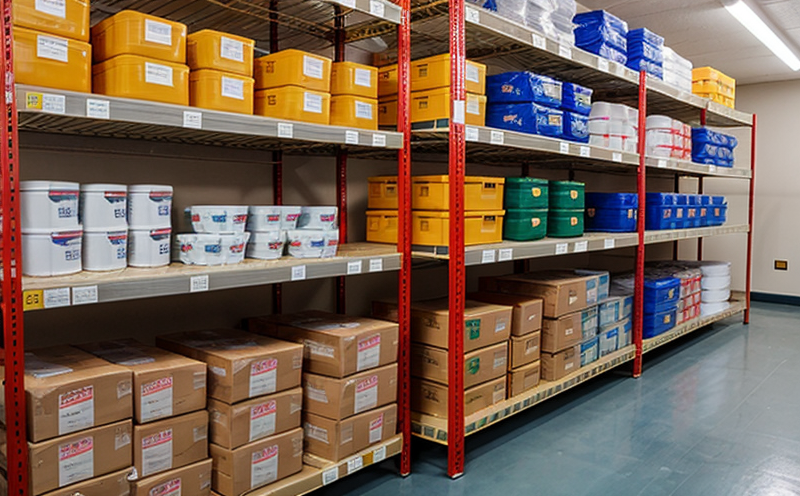Endotoxin Level Stability Testing
The integrity of pharmaceutical products is paramount to ensuring patient safety and efficacy. Endotoxin testing plays a crucial role in this regard, particularly for injectable drugs such as antibiotics, immunoglobulins, and vaccines. This service focuses on the stability and shelf-life testing of endotoxins, which are lipopolysaccharides found in the outer membrane of Gram-negative bacteria.
Endotoxin levels can change over time due to various factors including temperature variations, exposure to moisture, and light. Understanding how these changes affect the stability of a product is essential for ensuring consistent quality across its shelf life. Our endotoxin level stability testing service employs validated methods compliant with international standards such as USP , EP 2.6.13, and JPC-40 to accurately assess the stability over time.
The process begins with receiving a sample from the client, followed by thorough preparation in our controlled environment laboratory. Once prepared, the samples undergo testing using quantitative chromogenic methods like the Limulus Amebocyte Lysate (LAL) test. This method detects endotoxin activity by measuring the formation of a chromophore as endotoxin reacts with lysates from horseshoe crab blood cells.
The stability study typically involves multiple time points over an extended period, often spanning months or even years depending on the product's expected shelf life. During this phase, samples are stored under various conditions to simulate real-world scenarios such as different temperature ranges and humidity levels. The data collected from these tests is meticulously analyzed using statistical tools like linear regression models to predict stability trends.
Our clients receive comprehensive reports detailing not only the results of individual test runs but also long-term stability predictions based on initial findings. These insights help manufacturers make informed decisions about product labeling, storage recommendations, and potential regulatory submissions. By adhering strictly to ISO standards for this service, we ensure that our testing aligns with global quality guidelines.
Our approach ensures accurate measurement of endotoxin levels throughout the entire lifecycle of pharmaceutical products. This reliability is critical given the stringent regulations governing pharmaceutical manufacturing worldwide. Compliance with these standards not only protects public health but also enhances brand reputation and trust among consumers.
- Compliance: Ensures adherence to USP , EP 2.6.13, JPC-40
- Methodology: LAL test for detection of endotoxin activity
- Data Analysis: Statistical modeling to predict stability trends
- Reporting: Comprehensive reports including individual and long-term results
Industry Applications
The pharmaceutical industry relies heavily on accurate endotoxin level testing to maintain product safety. This service is particularly relevant for developing new drug formulations where ensuring stability over the intended shelf life is critical.
In vaccine production, maintaining consistent low levels of endotoxins throughout manufacturing and storage processes helps prevent adverse reactions in immunized individuals. Similarly, in biopharmaceuticals like monoclonal antibodies, controlling endotoxin contamination ensures that these complex molecules remain stable during extended periods of use.
For injectable medications such as antibiotics or chemotherapy agents, it's imperative to monitor endotoxin levels post-production through stability testing. This helps identify any potential issues early in the product lifecycle and allows for corrective actions before widespread distribution. By providing reliable data on how endotoxins behave under different environmental conditions, our service supports better formulation decisions and improved patient outcomes.
Additionally, this service can aid in validating new packaging materials or storage solutions designed to extend shelf life while minimizing exposure to factors that may increase endotoxin levels.
Customer Impact and Satisfaction
- Enhanced Product Safety: Accurate measurement ensures no adverse effects due to high levels of endotoxins.
- Better Formulation Decisions: Provides insights into how changes in formulation impact stability over time.
- Regulatory Compliance: Ensures all tests meet strict international standards, facilitating smoother regulatory submissions.
- Improved Patient Outcomes: By identifying potential risks early on, this service contributes to safer treatments for patients worldwide.
In summary, our endotoxin level stability testing service directly impacts the quality and safety of pharmaceutical products. It enables companies to make informed decisions regarding product development, manufacturing processes, and packaging strategies. This not only enhances overall patient care but also strengthens brand reputation by demonstrating a commitment to high standards of hygiene and efficacy.
Environmental and Sustainability Contributions
In the context of pharmaceutical testing services, particularly endotoxin level stability testing, there are several ways in which this contributes positively towards environmental sustainability:
Firstly, by ensuring that products meet strict quality standards right from their inception, less waste is produced during manufacturing processes. This reduces both energy consumption and raw material usage associated with rework or scrapping substandard batches.
Secondly, accurate testing helps prevent the release of potentially hazardous materials into the environment through proper disposal practices based on validated stability data. For instance, if a particular formulation exhibits poor stability under certain conditions, it might be avoided altogether in favor of more robust alternatives that require less frequent replacement or disposal.
Lastly, by promoting best practices in storage and handling, this service indirectly supports efforts aimed at reducing carbon footprints within the pharmaceutical supply chain. Properly stored products last longer, requiring fewer reorders and thus lowering transportation emissions.





